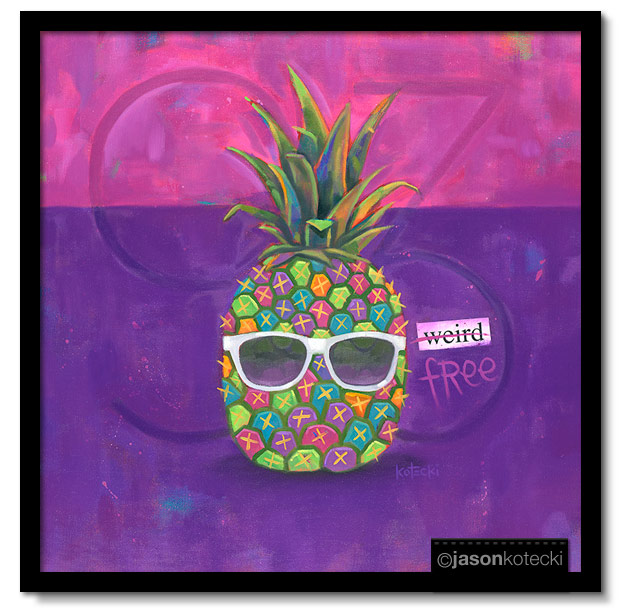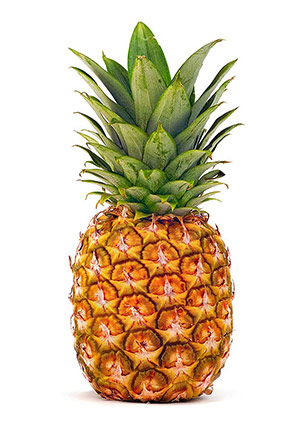
Original is SOLD. Prints available here.
Many fruits have a similar vibe. You get some variations in color and texture, but “round” is pretty much the regular shape.

Even the tomato, which I grew up being taught was a vegetable, wants to get in with the fruit group. And upon a quick glance, we say, “Sure, whatever, you seem to fit the description.”

And then there’s the pineapple.
Compared to most fruits, pineapples are weird. Unfortunately, weird isn’t usually a compliment.
Before I take the stage for a speech, at the very end of my introduction, there is a passage that talks about me “spending time with my beautiful wife and three weird kids.”
It’s always fun – and telling – to see how the introducer handles this bit. Sometimes they read it as is, but other times they are quick to uncomfortably interject, “I didn’t write that!” I’ve even had some who eliminate it altogether.
Ultimately I exclaim to them that, in our household, being called “weird” is a badge of honor. For example, one day, my wife was telling my oldest daughter that it’s OK to be weird. It makes life more interesting, she said, and like Rudolph the red-nosed reindeer, the things that make us weird are often our greatest superpowers. She informed Lucy that being weird makes life better.
The next day, we heard Lucy asking her little brother, “Ben, are you weird?”
“No,” he replied, innocently.
“Then you’re going to have a horrible life.”
Now don’t get me wrong. It is possible to be too weird. “Licking-the-salt-from-almonds-and-putting-them-back-in-the-bowl” kind of weird. Or “owning-thirty-seven-cats-and-dressing-them-all-to-look-like-Taylor-Swift” weird.
So the rule of thumb in our family is that you should shoot for 93% weird; anything after that is just too much.
The cold hard truth is that most of us aren’t anywhere near that level of weird.
When we were kids, at the very beginning, we were all weird. We made up weird games, had weird bedtime routines, enjoyed weird hobbies, and dressed up in weird clothes in weird combinations. But eventually, someone sees us living our bliss, decides it’s weird and shames us. We get made fun of in the schoolyard, on the bus, or across the dinner table. For the first time, it occurs to us that some of the things we do might be looked upon with contempt by another person.
From then on, we start paying attention. We start noticing what’s “in” and what’s not. We take heed of the things that could get us ridiculed, singled out, and shamed. And we stop doing them. We smooth out the rough edges and start hiding our weirdness. And one by one, little parts of us die.
Possibly the greatest tragedy of our lives is that we spend so much time conforming to the world around us, just to avoid that feeling of shame ever again.
And the world is worse off for it.
“Ridicule is the terrible witherer of the flower of the imagination. It binds us where we should be free.”
–Madeleine L’Engle
People only have the power to shame us if we give it to them. When we surrender our weird, we are imprisoning ourselves and handing over the key. It’s too expensive to pay attention to what everyone else thinks.
Because when we do, and as Adultitis settles in…
Our choices become limited.
Our possibilities shrink.
Our life becomes boring.
We need to embrace our weird. About 93% worth.
Do that, and you’ll realize that you’re not weird, you’re free.